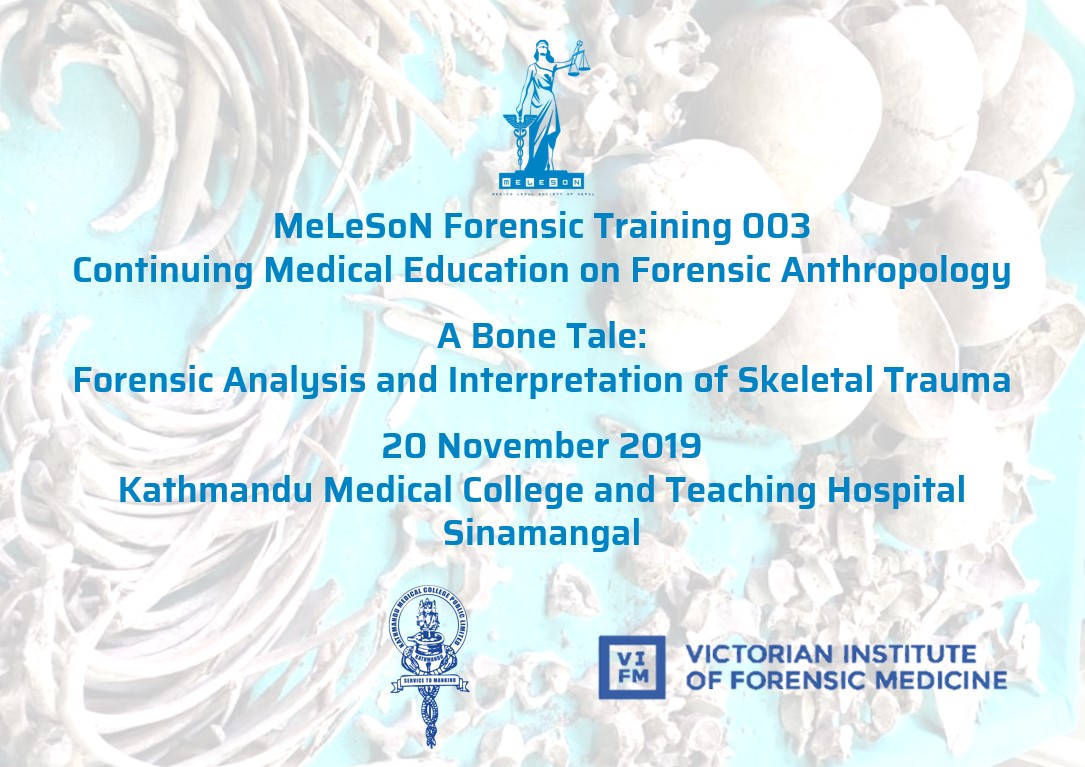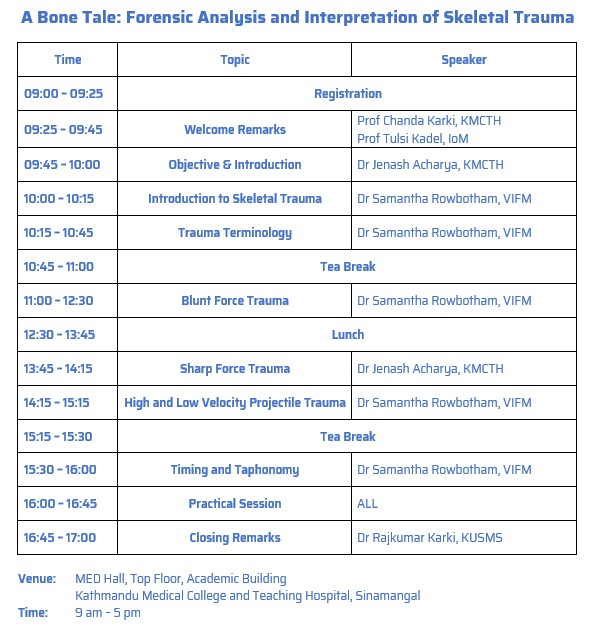
Background
In line with the views of the society for the development of the medico-legal services in Nepal, Medico-Legal Society of Nepal – In collaboration with Kathmandu Medical College and Teaching Hospital and Victorian Institute of Forensic Medicine – will be conducting a “Continuing Medical Education on Forensic Anthropology” on the 20th November 2019 at KMCTH, Sinamangal.
The CME will consist of interactive lectures, discussions and a practical session on “Forensic Analysis and Interpretation of Skeletal Trauma.”
Forensic anthropological examination is a vital part of any medico-legal investigation, especially in ‘cold’ forensic cases as well as cases of extra-judicial killings and other forms of gross violation of Human Rights. These cases are generally associated with the examination of human remains that are either partially or completely skeletonised and require specialised training to ensure systematic documentation and reporting.
Rationale
It is thus important to develop competency and ensure uniformity in the medical examination of skeletal remains, that are in accordance with national as well as international standards and protocols.
Purpose
This training will focus on the examination and documentation of findings and their interpretation and reporting to assist in the judicial process and will also aim to bring consistency in the medico-legal examination of human skeletal remains throughout the medico-legal system of Nepal.
Objectives
- To develop the capacity of forensic specialists in examination, documentation, and reporting of skeletal human remains, with a focus on skeletal trauma.
- To standardize Reporting in Forensic Anthropology cases, with special reference to interpretation and reporting of skeletal trauma, that is in line with National and International Standards, Guidelines and Protocol
Expected outcomes
Develop trained human resources in Forensic Anthropology throughout Nepal
Develop trained personnel for the medico-legal examination of skeletal remains throughout Nepal
Help in the deliverance of justice in cases of extra-judicial killings and other forms of gross violations of Human Rights
Lead Trainer

Dr. Samantha Rowbotham is a Forensic Anthropologist with the Victorian Institute of Forensic Medicine, Melbourne, Australia. She also holds an Adjunct Research Fellow appointment with the Department of Forensic Medicine at Monash University and is a Forensic Anthropology Trainee with the Royal College of Pathologists of Australasia (Faculty of Science). Samantha was a recipient of a VESKI Victoria Fellowship (2017) and the Australian Academy of Forensic Sciences ‘Oscar Rivers Schmalzbach’ Research Fellowship (2019). Dr. Samantha holds a Bachelor of Arts in Archaeology and History from the University of Queensland (2010); a Master of Archaeological Science (Research with First Class Honours) from the Australian National University (2012), and a Doctor of Philosophy in Forensic Medicine from Monash University (2018). Since 2009 she has been involved with archaeological excavations, osteology research and bioarchaeology teaching projects in Asia, Europe, Central America, and Australia. From 2014 to 2017 she assisted with forensic anthropology casework in Victoria, and since 2018 she has undertaken forensic anthropology casework for the VIFM.
Registration Fees
Rs 500 (including lunch and tea). Please pre-register as Spot Registration is not available
Does not Include Accommodation, Transportation, etc.
Bank details
Bank Name HIMALAYAN BANK LTD. Branch Maharajgunj
Beneficiary Medico-legal Society Of Nepal
Account Number 002 0600526 0016
Final Schedule

Register Here! for MeLeSoN Training 003 – CME on Forensic Anthropology
Scientific Ghostwriter ist ein Begriff, der sich auf jemanden bezieht, der wesentliche Forschungsarbeiten leistet und Beiträge zu einem Papier unter dem Namen eines renommierten Autors geschrieben hat. Dies ist wissenschaftlicher ghostwriter eine gängige Praxis beim medizinischen Verlagswesen, und eine neue Studie legt nahe, dass sie als Forschungsfehlverhalten behandelt werden sollte.